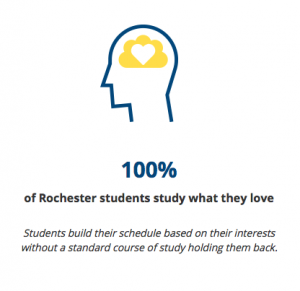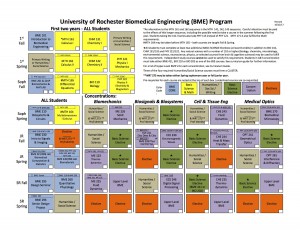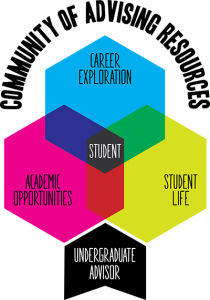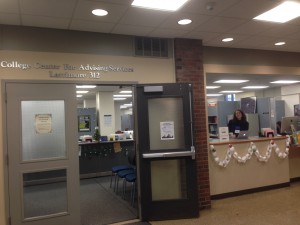Hi, everyone! This month’s blog is pretty special to me because I’ve been working on it for a pretty long time (ever since I thought of the punny title). As I’ve finally declared my major (biomedical engineering), I wanted to share some tips/suggestions/wise words with you all about the process of deciding your major and officially declaring it!

1. You don’t apply to a specific major
When you apply to the University of Rochester, you apply to the University as a whole, instead of to a specific major or department. There are also no caps on the majors here (even the engineering ones), so you really don’t need to worry about getting accepted as an Art major when you have never taken an art class before.
Most prospective students declare “potential majors” when they apply, which gives them a lot of breathing room in terms of deciding their future career paths. Nobody really expects you to have your whole life planned out when you apply, and listing down your potential areas of interest just lets the University of Rochester know which way you are somewhat inclined.
2. You typically declare as a sophomore
When you do come to the University, there is no “required” semester during which you have to officially declare your major, but most people do it around the end of their sophomore year (when they are completing 64 credits). This gives you a lot of time to explore your options by taking classes in different fields, and also figure out what you like and don’t like. Ultimately, the goal is to start taking steps toward your intended career path by a reasonable time, so you have enough space in your schedule to explore real-world opportunities, like internships, research, etc.
3. You can do whatever you want, so EXPLORE!
The great thing about being at U of R is that you can take any course you want, in any major and any school you want! Maybe you want to learn how to play the piano; well, you can take an introductory piano lesson at the Eastman School of Music. Or let’s say you want to get a jumpstart on your medical school classes; you can take them at the Medical Centre. Nobody is going to stop you from taking courses (unless there are a lot of pre-requisites), so feel free to go out and take something fun!

4. You can change your mind
As I mentioned earlier, nothing is written in stone! You are allowed (and even encouraged) to change your mind as you find out more about yourself and your interests. College is the best time to figure out who you are as a person, and that involves straying from your original plans (a lot)! I remember when I first came to Rochester, I had my four-year schedule planned out with all the classes and clubs that I was going to get involved in (yes, I did go a little overboard). And now, after three semesters, I’ve honestly changed my schedule over twenty times. You’ll probably end up doing the same, and honestly, there’s nothing wrong with that.

5. You have a lot of people to help you
Like I always say, there are a lot of resources available here at the University of Rochester that can help you navigate your “major” problems.
- To start off, you are assigned an undergraduate advisor (previously, pre-major advisor) when you first come to Rochester, and they are your primary contact when in doubt about anything major-related. Your undergraduate advisor helps you decide on and register for classes, figure out research and internship opportunities, and gives you advice about college in general. I can honestly say that my advisor, Professor Buckley, has been a really important source of guidance for me, and I probably would’ve been so lost in college if it wasn’t for him!
- Peer advisors are also a great resource! They are upperclassmen who help you declare your major, explore study abroad programs, research and internships, and connect with faculty members. There are peer advisors for all departments and majors on campus, and even exploratory peer advisors if you are undecided and need some general guidance. The best part is that they are students themselves and have been in your shoes at least once in their lives before (and are thus more able to give you the inside scoop).
- The College Center for Advising Services (CCAS) is the main organization that provides academic advising to all undergraduates to help them succeed. Located in Lattimore Hall, CCAS has walk-in advising for various things like planning your program schedule, registering for classes, degree requirements, declaring your major, minor or cluster, and independent study. Overall, if you have questions about any academics-related topic, CCAS is where you would go!

And now that you’ve made it this far, I have one last tip for you all: don’t worry! Your major is just step one in a list of many other career-related things. There is no limit to what you can do, and your undergraduate major doesn’t lock you in as much as you’d think. You can go from being an engineer, to getting an MD, and then end up owning a business. Who knows where life is going to take you? You just got to brace yourself, and strive to be ever better!


